
At a time when companies doing away with performance management are getting a lot of media attention, a number of fresh ideas have emerged. The challenge for companies attempting to change performance management is a need to move past a dialogue centred on the process. “To rate or not to rate” or “how often” are questions perhaps better addressed when companies have answered one fundamental question: What is the point of performance management?
In high-performing organizations, where there is an instinctive knowledge of what good performance looks like and goals are well defined, then dialogue is of the most value when it focuses on the future and how the employee fits into that vision.
The opportunity for organizations lies in engaging employees, including painting a picture of how employees fit into the broader organization and describing long-term career paths. This needs to done on an ongoing basis rather than in a year-end appraisal format.
Effective upward feedback and measurement generally requires an organizational culture that is comfortable with transparency and openness. Developing a feedback-rich culture entails establishing a robust 360-feedback system.
Examining base pay positioning for employees and critical jobs over time can help an organization be prudent and targeted with limited compensation budgets. Although uncommon in the marketplace, substantially rewarding strong people management, and integrating it into the employee value proposition, can help organizations differentiate themselves.
Fill in your email details for this free resource from HRD Asia.